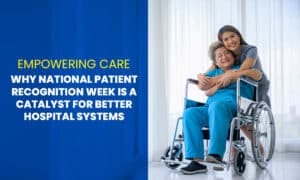
Ageing is inevitable, but unhealthy ageing doesn’t have to be. As the global population of older adults steadily increases, hospitals are stepping up as vital hubs for promoting senior fitness and encouraging healthy ageing. From personalized wellness programs to structured care plans, medical institutions have the power to redefine how ageing is perceived—not as a slow decline, but as a vibrant, active stage of life.
In this blog, we’ll explore the challenges senior citizens face regarding health and fitness, examine research that highlights these concerns, and dive deep into how hospital-based wellness programmes for older adults can change lives. Let’s begin this transformative journey toward empowering senior health.
The Declining State of Senior Health and Fitness: A Growing Concern
The World Health Organization (WHO) projects that by 2030, 1 in 6 people globally will be over the age of 60. While this reflects increased life expectancy, it also reveals the rising burden of chronic diseases and sedentary lifestyles among seniors.
Scientific Evidence of Declining Senior Health
A 2023 study published in The Lancet Healthy Longevity found that over 70% of adults aged 65+ suffer from at least one chronic disease, with hypertension, arthritis, and type 2 diabetes leading the chart.
The CDC reports that nearly 38% of adults over 65 fail to meet the recommended physical activity guidelines, which directly contributes to muscle loss, reduced balance, and cognitive decline.
Another report from the National Institute on Aging (NIA) shows that seniors who are physically inactive are at a 44% higher risk of early mortality compared to those who maintain a fitness routine.
Decline in Senior Health (2019 – 2024)
| Health Indicator | Observed Decline / Risk | Consequence |
| Functional Ability (Post-hospitalization) | 35% (age 70+), 50% (age 85+) | Increased dependency, loss of independence |
| Gait Speed (Measure of mobility decline) | ~17% decline over 5 years | Fall risk, lower quality of life |
| Rehospitalization Rate (Lack of rehab care) | Increased by 12% in seniors | Poor recovery, increased medical cost |
| Muscle Strength / Sarcopenia Progression | 21% faster in sedentary patients | Loss of strength and mobility |
| Cognitive Decline (No mental stimulation) | 13% increase in cognitive issues | Memory loss, depression |
| Malnutrition / Nutritional Risk | Up to 20% unreported cases | Weak immunity, longer hospital stay |
| Effect of Wellness Programs (when implemented) | 26% reduction in functional decline | Better recovery, improved long-term outcomes |
Over the past five years, senior health has experienced a steady decline—largely due to the absence of structured, hospital-based wellness programmes. While medical care addresses immediate illnesses, it often overlooks essential aspects of senior well-being such as mobility, cognition, nutrition, and long-term recovery.
Recent studies reveal that 35% of hospitalised individuals over 70, and up to 50% of those over 85, suffer a decline in basic functional abilities during their hospital stay. This includes difficulty walking, reduced strength, and increased dependency—factors that seriously affect quality of life after discharge.
A significant 17% decline in gait speed over five years, and a 21% acceleration in muscle loss among inactive elderly patients, further emphasise the risks of hospitalisation without integrated wellness support. Additionally, rehospitalisation rates have risen by 12%, mainly due to a lack of follow-up rehabilitation, nutritional care, and mental health engagement.
Cognitive Impact
The cognitive impact is equally alarming—13% more seniors are now facing memory and concentration issues due to insufficient cognitive stimulation during recovery. Compounding the issue, nearly 1 in 5 seniors suffer from undiagnosed malnutrition, slowing healing and increasing vulnerability to illness.
However, research also shows that where hospital wellness programmes are in place, there’s up to a 26% reduction in functional decline. Programmes that combine physical activity, nutritional support, and cognitive engagement significantly improve outcomes and reduce the need for repeat care.
These findings strongly advocate for the implementation of comprehensive geriatric wellness programmes in hospitals—not just to treat illnesses, but to empower healthier, independent ageing.
These findings make it clear: the golden years are increasingly burdened by preventable health issues. What’s missing? Access to structured, supportive, and hospital-driven wellness systems that focus on senior fitness and healthy ageing.
Hospital-Based Wellness Programmes for Older Adults: A Path to Renewed Vitality
Hospitals are uniquely positioned to drive impactful changes in senior health. With trained professionals, specialised infrastructure, and real-time medical oversight, they can provide evidence-based care that promotes healthy ageing.
Comprehensive Health Assessments for Senior Fitness

Before implementing any intervention, a thorough evaluation is essential. Hospitals must incorporate:
- Geriatric screenings: Cognitive health, musculoskeletal strength, mobility, and vision.
- Chronic disease monitoring: Blood pressure, cholesterol, glucose levels.
- Nutritional profiling: Assessing deficiencies and malnutrition risks.
This allows hospitals to tailor wellness solutions to each individual’s needs—a fundamental step in promoting senior fitness.
Healthy Ageing Tips for Older Adults Through Hospital Programmes
1. Structured Exercise Programmes in Clinical Settings
Hospitals can offer in-house fitness classes or connect seniors to safe physical activity programmes, including:
- Low-impact aerobics for cardiovascular endurance.
- Chair yoga and Tai Chi for balance and flexibility.
- Resistance training to preserve muscle mass.
A 2023 study in the Journal of Geriatric Physical Therapy concluded that hospital-supervised resistance training twice a week reduced fall risk in adults over 70 by 31% over six months. These targeted exercise regimens are critical for improving mobility, reducing dependency, and supporting healthy ageing.
2. Personalised Nutritional Support and Meal Plans
Nutrition plays a pivotal role in maintaining senior health. Hospitals must provide:
- Dietician-led counselling for weight and chronic condition management.
- Anti-inflammatory diets rich in omega-3s, fibre, and antioxidants.
- Meal preparation classes and access to hospital cafeterias offering senior-specific meals.
One report from Harvard Medical School (2023) noted that older adults following a Mediterranean-style hospital diet experienced 22% better cardiovascular outcomes over a one-year span.
3. Cognitive and Emotional Health Interventions
Hospitals must recognise that healthy ageing isn’t only physical—it’s mental too. They offer:
- Mindfulness and meditation therapy
- Group counselling sessions
- Memory-stimulation activities like puzzles, music, and art therapy
According to a 2022 study from Frontiers in Aging Neuroscience, older adults participating in hospital-based cognitive engagement programmes saw a 40% improvement in memory recall and attention span within three months.
Healthy Ageing Tips for Older Adults: Making Hospitals a Wellness Hub

To make hospitals more senior-friendly, here are some powerful healthy ageing tips for older adults integrated into hospital programmes:
- Create wellness lounges which are like a comfortable area where seniors can rest, socialise, and receive care.
- Use visual signage and mobility aids to make hospital navigation easier.
- Offer workshops on fall prevention, medication management, and ageing gracefully.
Building a Future Where Every Senior Thrives
Hospitals have the power to move beyond being treatment centers—they can be prevention and wellness hubs that uplift the lives of older adults. Through personalised care plans, integrated fitness programmes, mental wellness activities, and continued home support, hospitals can dramatically reshape the way we approach senior health.
The future of healthy ageing lies in proactive, inclusive, and compassionate care. And it starts within our hospitals.
Let’s envision a world where senior fitness is not a luxury but a standard—empowered by medical institutions that care, support, and guide our elders toward a peaceful, active life.





